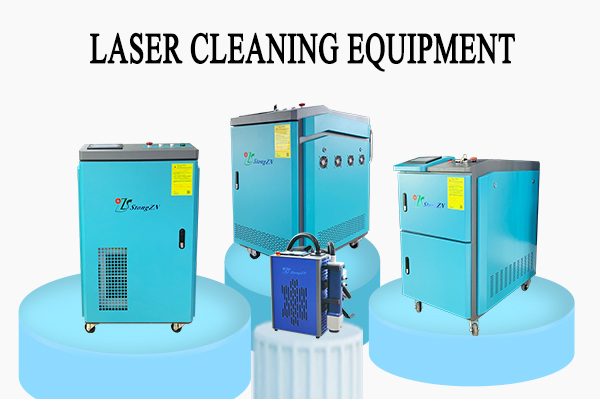
Laser cleaning is a new type of green and environmentally friendly cleaning method. The pulsed laser used has a long service life and is suitable for hand-held and robot cleaning operations. It has a universal wheel and is easy to move.
Shengtong Intelligent Laser Equipment Group is a "specialized, special and new" and "national high-tech" enterprise integrating R & D, production and sales. It owns two laser brands "Shengtong" and "Chengjing" and a number of holding companies. It has a number of core R & D personnel from Tsinghua University, Chinese Academy of Sciences and other famous institutions. It has established long-term and stable cooperative relations with many professional laser research institutions at home and abroad, and has provided a series of complete laser cleaning solutions and related supporting facilities for domestic and foreign customers.
Independent R & D team: It has many core R & D personnel fromTsinghua University, Chinese Academyof Sciences and other famous institutes.
Professional Answers: Provide customerswith information on products, prices, technologies, and industry solutions.
Free proofing: In the early stage, we will provide customerswith free proofing testsand mail them.
Collaboration with institutions: Collaboratewith renowned scientific research institutions and many institutions of higher learning to give equipment excellent performance.
Customized service: Shengtong Intelligent LaserEquipment Grouphas standard equipment,which can alsobe customized toachieve automated cleaning.
Worry-free after-sales: Shengtong Intelligent Laser Equipment Group has a strong after-salesservices team!,and the products are completely independently developed and master the core technology. After-sales is guaranteed!

A true source manufacturer with 13 years of industry experience
.png)
All mechanical parts are processed independently, and laser cleaning is a national manufacturing enterprise
.png)
Renowned scientific research institutions and many institutions of higher learning cooperate to endow equipment with excellence
.png)
Strictly controlled product quality supervision, comfortable to buy and safe to use
.png)
High production and sales for more than ten consecutive years, serving thousands of users
.png)
Dozens of processes are strictly controlled, and each equipment is qualified to leave the factory
Laser cleaning The traditional cleaning industry has a variety of cleaning methods, mostly using chemical agents and mechanical methods for cleaning. Laser cleaning can be used not only to clean organic pollutants, but also to clean inorganic substances, including metal rust, metal particles, dust, etc. The principle of laser cleaning is to use high-frequency and high-energy laser pulses to illuminate the surface of the workpiece, and the coating layer can instantly absorb the focused laser energy, so that the oil stains, rust spots or coatings on the surface are instantly peeled off, and the surface attachments or surface coatings can be removed at high speed and effectively. [更多]
Molds play a very important role in industrial production. And mold cleaning is the key to maximizing the service life of molds, improving the reliability of molds, and ensuring product quality. Mold cleaning is a key process in mold maintenance, and it is also a bottleneck restricting mold maintenance. Because the speed of mold manufacturing and development is much faster than the speed of mold cleaning, and the mold is ready for the next production immediately after rapid cleaning, so the time left for mold cleaning is quite limited, and it is more important to choose a favorable way to clean molds, because it can not only ensure the quality of subsequent production products, mold maintenance and cleaning, but also help enterprises improve work efficiency.[更多]
With the rapid development of the global internationalized economy, rail transportation has developed rapidly. China has also tightened the infrastructure of railways, and the rail transit equipment manufacturing industry has also presented a broad market prospect and huge development potential. It provides opportunities for the construction of railway equipment manufacturing bases. At the same time, the demand for its supporting service industries has also increased sharply. With the improvement of people's awareness of environmental protection and safety, environmental protection, safe and efficient cleaning and laser cleaning are increasingly favored by the rail transit industry.[更多]
With the rapid development of the global internationalized economy, rail transportation has developed rapidly. China has also tightened the infrastructure of railways, and the rail transit equipment manufacturing industry has also presented a broad market prospect and huge development potential. It provides opportunities for the construction of railway equipment manufacturing bases. At the same time, the demand for its supporting service industries has also increased sharply. With the improvement of people's awareness of environmental protection and safety, environmental protection, safe and efficient cleaning and laser cleaning are increasingly favored by the rail transit industry.[Move]
In the high-end manufacturing industry, industrial products in electroplating, phosphating, spraying, welding and assembly, in order to ensure the quality of the workpiece, dirt, grease, dust, rust and other contaminants must be removed from the surface of the product. At present, the most commonly used surface cleaning methods are mechanical cleaning and chemical cleaning. With the increasingly stringent requirements of China's environmental protection regulations and the continuous development of products towards precision and high-end, traditional cleaning methods have been unable to meet the cleaning requirements of high surface cleanliness, high efficiency, low cost and high environmental protection.[Move]
Laser cleaning is known as "the most promising green cleaning technology in the 21st century". With the acceleration of industrialization and the steady advancement of the "double carbon" goal, it has gradually replaced traditional cleaning processes in many fields, and has gradually become an indispensable equipment manufacturing technology in high-end manufacturing fields such as industry, rail transit, ships, and aerospace. The concept of laser cleaning originated in the mid-1980s, and its principle is to use high-frequency short-pulse lasers as a cleaning solution for the working medium.[Move]